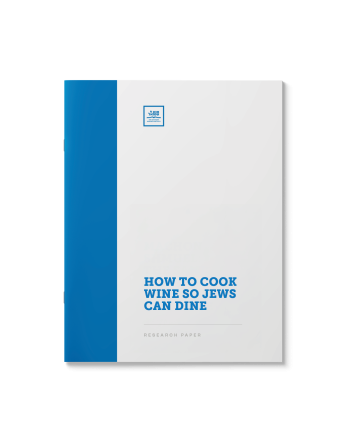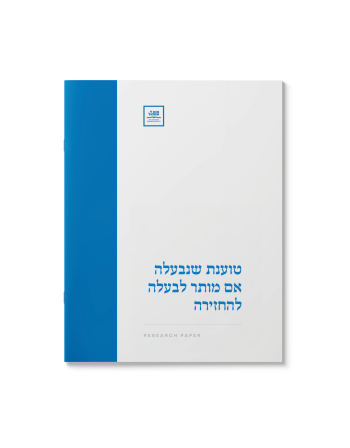Unraveling the Tefillin
$39.00
This paper is a sequel to Tefillin 101 and provides an expanded view of the halachic and esoteric dimensions of the mitzvah of Tefillin.
| Language | English |
|---|---|
| Paper Type | Research Paper |
| Pages | 10 |
Related Products
כבוד ההורים היא מצוה גדולה וחשובה עד מאד. אך ממבט ההלכה, מהי הגדרת המצוה והמגבלות שלה? מהו נכלל בכבוד או במורא? למען יאריכון ימיך.
A detailed look at the history and laws of yayin nesech. Can an irreligious Jew render wine yayin nesech? Is pouring wine part of the prohibition? What difference does pasteurization make?
Does making tztitis at night make them invalid? What was the
position of the Rebbeim in this regard?
שאלה נפוצה בדיני טבילת כלים היא לענין מכונת הקפה הביתית. האם אמנם חייבים אנו לטבול אותה? בעזרת טכנאי, המאמר שלפנינו מפרק את חלקי המכונה, ומציע מסקנה הלכתית מעשית.
מקובלת ההנחה כי שונים הם תנאי כשרות הבהמה והחיה מהעוף. אם העוף נאכל לפי המסורת היהודית, הרי שהבהמה והחיה נאכלים לפי הסימנים המנויים בתורה. או שמא לא? האם המסורת משפיעה היא גם על כשרות הבהמה והחיה?
Food makes the world go around. But for the Jewish consumer there’s a whole other angle to consider: is the food Kosher?
To the discerning Jewish palate, the question also relates to the rationale behind the mitzva. Are there material or spiritual benefits to be had from its fulfillment or must it be carried out only because G-d has so ordained it?
This paper features a compendium of sources for the
instruction of foundational aspects of the mitzvah of Tefillin.
It has saved many a Shabbos meal and avoided much embarrassment. But how exactly does yayin mevushal address the problem of yayin nesech? What is the technical definition of mevushal? A behind-the-scenes look at kosher wine production and its laws.
Many of contemporary society’s challenges could be remedied by the observance of the mitzvah of honoring one’s parents. Yet Kibbud Av V’Em is a broad and sweeping mitzvah with vaguely defined boundaries. To what extent are we obligated? Are we required to sacrifice our own social life to care for our parents? Does it apply to marriage partners? How do we define respect? Learn the Torah’s definition of honoring our parents.
Your hostess has labored to prepare a tongue tantalizing gourmet dinner, but alas – her fine china dishes were never ritually purified by immersion in a Mikvah. How do you navigate this delicate situation?
Jewish law regulates the consumption of food cooked by a Gentile. Is microwaving considered cooking for this purpose? This paper
illustrates how the ancient kashrut laws apply to modern technologies.










![The Kosher Diet - Healthy in Body and Soul [New!]](https://catalog.myjli.com/wp-content/uploads/2025/05/SAMSTKD-350x448.png)




